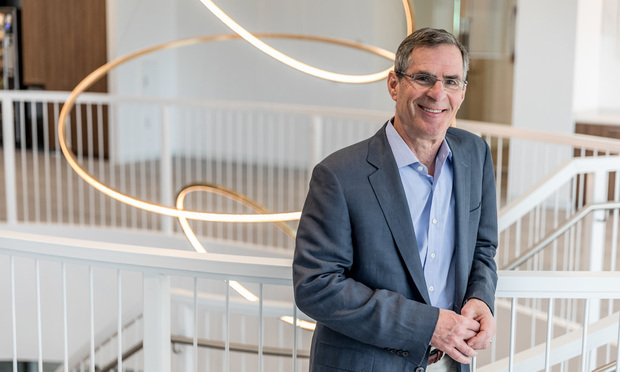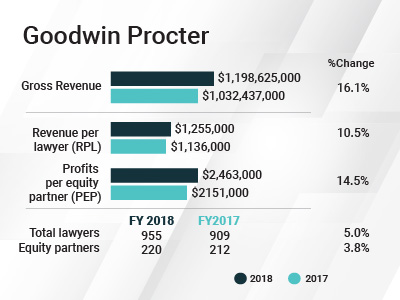Goodwin Procter Sees Revenues Soar on Tech, Life Sciences Deals
Citing its private equity work for life sciences and technology clients, chairman David Hashmall says the firm has been focused on "the convergence of capital and innovation."
February 13, 2019 at 05:30 AM
5 minute read
 Goodwin Procter chair David Hashmall. Photo: Jason Doiy/ALM
Goodwin Procter chair David Hashmall. Photo: Jason Doiy/ALM
Revenue at Goodwin Procter increased for the sixth consecutive year in 2018, reaching a new all-time high for the 107-year-old firm.
Gross revenue jumped 16.1 percent to $1.198 billion, with revenue per lawyer increasing 10.5 percent to $1.25 million, according to preliminary ALM reporting. Profits per equity partner rose 14.5 percent to $2.46 million.
Goodwin chairman David Hashmall, who has led the Am Law 100 firm since 2014, said the strong financial growth can be attributed to a strategic focus on six core practice areas.
 Over the past several years, Goodwin has focused on expanding in its technology and life sciences practice, as well as its securities, white-collar litigation and regulatory, real estate, private equity, intellectual property litigation and financial institutions groups.
Over the past several years, Goodwin has focused on expanding in its technology and life sciences practice, as well as its securities, white-collar litigation and regulatory, real estate, private equity, intellectual property litigation and financial institutions groups.
“We've been really focusing on the convergence of capital and innovation,” he said.
The firm stands apart for the intersection between its technology and life sciences practices and its private equity work, Hashmall said.
“We feel that we are somewhat unique, and one of the very few firms that developed real dominance and expertise in technology and life sciences on the one hand and private equity on the other,” he said. “I think that's what has really been driving our revenue growth.”
Goodwin's private equity and life sciences practices each grew their revenue by 31 percent from the prior year, while the technology practice grew revenue by 20 percent, the firm said.
The firm last year advised Belgian biotech company Ablynx in its $4.8 billion sale to French drugmaker Sanofi. It also advised longtime client GTT Communications Inc. in its $2.3 billion acquisition of Interoute Communications Ltd, Europe's largest cloud services platform.
Goodwin also worked with Keryx Biopharmaceuticals Inc. in its $1.3 billion merger with Akebia Therapeutics Inc. Its life sciences team also advised on a series of initial public offerings of pharmaceutical companies totaling more than $653 million last summer.
“A lot of the work that we do in private equity and life sciences is related to technology practices because of how innovative these industries are becoming,” said Michael Caplan, Goodwin Procter's chief operating officer.
“We're really driving a connectivity strategy across all of our business units,” he said, adding that the strategy not only helps the firm when it comes to working with clients but also helps Goodwin attract laterals.
Head count at the firm grew 5 percent in 2018 to 955 lawyers across its 10 offices worldwide. Its equity partner ranks increased 3.8 percent to 220 partners, and its nonequity tier grew 5.6 percent to 133 partners.
Among notable lateral additions last year, Goodwin added a team of lawyers from Dechert to bulk up its life sciences group in Europe. In the U.S., the firm added four partners from Greenberg Traurig, including the former chair of Greenberg's U.S. international trade commission practice, Mark Davis, to its intellectual property and ITC practices in Washington, D.C.
On the West Coast, the firm brought on Vinson & Elkins' intellectual property co-chair Darryl Woo in San Francisco, as well as a trio of partners from Gunderson Dettmer Stough Villeneuve Franklin & Hachigian, including Joshua Cook, who had led Gunderson Dettmer's San Francisco office since 2013.
In Silicon Valley, where Goodwin unveiled new office space last spring, the firm made several high-profile hires, including the former chairman of Fenwick & West's private equity group, Scott Joachim, and Fenwick private equity partner David Johanson.
The firm also bulked up its global professional staff, adding Linklaters' chief operating officer for the emerging Europe, Middle East and Africa regions, Uli Kleinsteuber, as its first-ever managing director of international operations. Caplan said the firm also brought on a new director of international finance and new human resource leader.
“It's helped with bringing in new laterals, integrating technology, collecting money, billing our clients, and setting up new offices much faster,” Caplan said of adding Kleinsteuber and others.
Along with traditional legal work, the firm is continuing to work with clients on their operational needs, whether that's implementing and testing new technology or counseling on diversity and inclusion strategies, without charging for those services, Hashmall said.
It's just not sufficient these days to just be prepared to answer the legal questions, said Hashmall, who will step down as head of the firm in September.
“You want to be the best outside counsel you can be, and I think by understanding and getting to know your clients business really well you can do a better job for the client and more efficiently,” he said.
This content has been archived. It is available through our partners, LexisNexis® and Bloomberg Law.
To view this content, please continue to their sites.
Not a Lexis Subscriber?
Subscribe Now
Not a Bloomberg Law Subscriber?
Subscribe Now
NOT FOR REPRINT
© 2025 ALM Global, LLC, All Rights Reserved. Request academic re-use from www.copyright.com. All other uses, submit a request to [email protected]. For more information visit Asset & Logo Licensing.
You Might Like
View All

Three Akin Sports Lawyers Jump to Employment Firm Littler Mendelson

Brownstein Adds Former Interior Secretary, Offering 'Strategic Counsel' During New Trump Term
2 minute read
Trending Stories
- 1How ‘Bilateral Tapping’ Can Help with Stress and Anxiety
- 2How Law Firms Can Make Business Services a Performance Champion
- 3'Digital Mindset': Hogan Lovells' New Global Managing Partner for Digitalization
- 4Silk Road Founder Ross Ulbricht Has New York Sentence Pardoned by Trump
- 5Settlement Allows Spouses of U.S. Citizens to Reopen Removal Proceedings
Who Got The Work
J. Brugh Lower of Gibbons has entered an appearance for industrial equipment supplier Devco Corporation in a pending trademark infringement lawsuit. The suit, accusing the defendant of selling knock-off Graco products, was filed Dec. 18 in New Jersey District Court by Rivkin Radler on behalf of Graco Inc. and Graco Minnesota. The case, assigned to U.S. District Judge Zahid N. Quraishi, is 3:24-cv-11294, Graco Inc. et al v. Devco Corporation.
Who Got The Work
Rebecca Maller-Stein and Kent A. Yalowitz of Arnold & Porter Kaye Scholer have entered their appearances for Hanaco Venture Capital and its executives, Lior Prosor and David Frankel, in a pending securities lawsuit. The action, filed on Dec. 24 in New York Southern District Court by Zell, Aron & Co. on behalf of Goldeneye Advisors, accuses the defendants of negligently and fraudulently managing the plaintiff's $1 million investment. The case, assigned to U.S. District Judge Vernon S. Broderick, is 1:24-cv-09918, Goldeneye Advisors, LLC v. Hanaco Venture Capital, Ltd. et al.
Who Got The Work
Attorneys from A&O Shearman has stepped in as defense counsel for Toronto-Dominion Bank and other defendants in a pending securities class action. The suit, filed Dec. 11 in New York Southern District Court by Bleichmar Fonti & Auld, accuses the defendants of concealing the bank's 'pervasive' deficiencies in regards to its compliance with the Bank Secrecy Act and the quality of its anti-money laundering controls. The case, assigned to U.S. District Judge Arun Subramanian, is 1:24-cv-09445, Gonzalez v. The Toronto-Dominion Bank et al.
Who Got The Work
Crown Castle International, a Pennsylvania company providing shared communications infrastructure, has turned to Luke D. Wolf of Gordon Rees Scully Mansukhani to fend off a pending breach-of-contract lawsuit. The court action, filed Nov. 25 in Michigan Eastern District Court by Hooper Hathaway PC on behalf of The Town Residences LLC, accuses Crown Castle of failing to transfer approximately $30,000 in utility payments from T-Mobile in breach of a roof-top lease and assignment agreement. The case, assigned to U.S. District Judge Susan K. Declercq, is 2:24-cv-13131, The Town Residences LLC v. T-Mobile US, Inc. et al.
Who Got The Work
Wilfred P. Coronato and Daniel M. Schwartz of McCarter & English have stepped in as defense counsel to Electrolux Home Products Inc. in a pending product liability lawsuit. The court action, filed Nov. 26 in New York Eastern District Court by Poulos Lopiccolo PC and Nagel Rice LLP on behalf of David Stern, alleges that the defendant's refrigerators’ drawers and shelving repeatedly break and fall apart within months after purchase. The case, assigned to U.S. District Judge Joan M. Azrack, is 2:24-cv-08204, Stern v. Electrolux Home Products, Inc.
Featured Firms
Law Offices of Gary Martin Hays & Associates, P.C.
(470) 294-1674
Law Offices of Mark E. Salomone
(857) 444-6468
Smith & Hassler
(713) 739-1250









